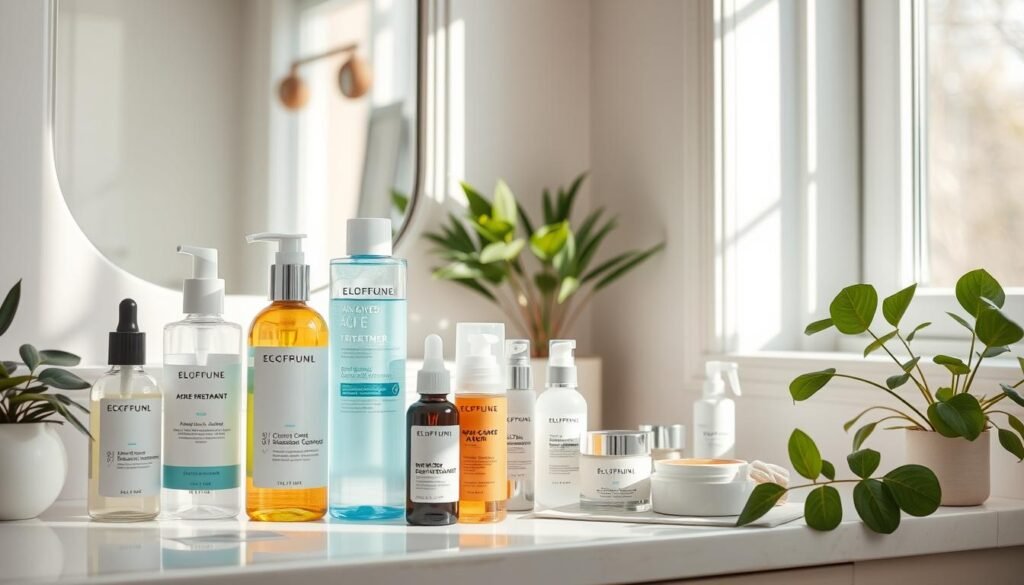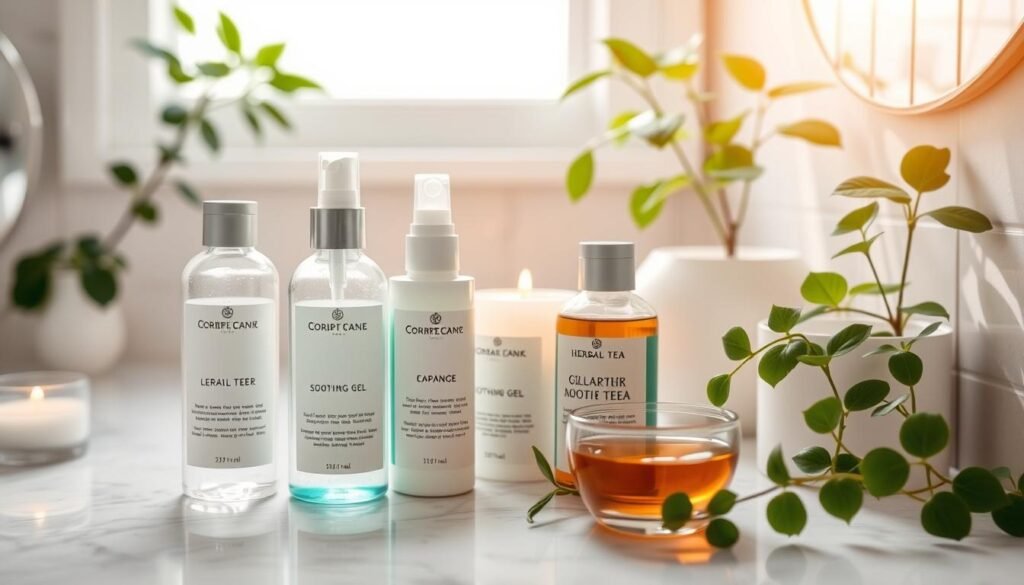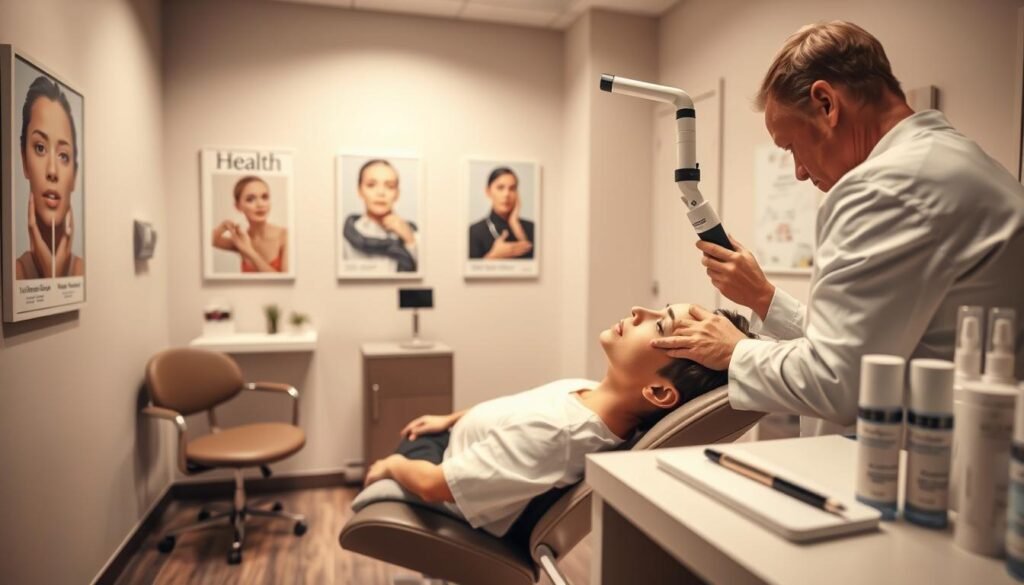Did you know nearly 85% of people get acne, including on the forehead? This is because the forehead encounters many irritants, hormones, and stress. It’s more than a skin issue; it can hurt confidence too. Knowing why you get forehead acne helps you choose the best treatment.
This article covers what causes forehead acne and how to treat it. We look at over-the-counter creams, prescription meds, and natural remedies. But first, we need to understand what causes those unwanted breakouts.
With the right steps, you can get tips for clear skin. These tips can treat acne and stop new pimples from forming. Whether you improve your skincare routine or see a professional, there’s hope for tackling forehead acne.
Key Takeaways
- Forehead acne is common in teens and adults, often due to hormones and stress.
- Dirt, oil, and bacteria block pores, leading to acne.
- Treatment varies from over-the-counter options to prescriptions, based on the acne’s severity.
- For mild symptoms, aloe vera and tea tree oil can help.
- Keeping a good skincare routine and steering clear of oily hair products can prevent acne.
- See a dermatologist for acne that’s severe or won’t go away.
- For more on treating forehead acne, check this resource.
Understanding Forehead Acne
Forehead acne is a common issue for both teens and adults. It shows up as bumps on the forehead. This happens when sebaceous glands, which produce oil, get blocked.
Why does forehead acne happen? The forehead has many sebaceous glands, so it’s more likely to get acne. Skin cells renew every 40 to 56 days. If this gets interrupted, pores can clog, leading to acne.
Genetics matter in getting acne. If your parents had it, you might too. Hormones and stress can also make acne worse. So can some medicines, like corticosteroids.
There’s a type of forehead acne called comedonal acne. It includes blackheads and whiteheads. Another kind, inflammatory acne, causes red and painful spots. Knowing the difference helps find the right treatment.
Knowing the signs and causes of forehead acne helps in treating it. Understanding is the first step to better skin.
What Causes Forehead Acne?
Understanding the causes of forehead acne helps tackle it better. Hormones play a big role. During puberty, menstruation, and pregnancy, hormone levels spike. This leads to more oil on the skin which can block pores.
Stress makes the situation worse by messing with hormones. Some medicines, like corticosteroids, can also trigger acne. This might catch people off guard if they’re using these drugs for other health issues.
Makeup and hair products might also be culprits. Oily hair gels and certain shampoos can lead to acne cosmetica. They block pores when mixed with sweat. Tight clothing and accessories also trap oil and sweat, making acne worse.
People with large pores and oily skin are more likely to get forehead acne. Low vitamin D levels can affect acne. So can not having enough zinc. But, vitamins A and B are good for the skin.
Knowing these acne triggers is key to finding the right hormonal acne treatment. Taking care of yourself is important. Washing your hair regularly, removing makeup before bed, and choosing the right skin products can help prevent forehead acne.
Factors Contributing to Acne Development
Knowing what causes acne is key to dealing with it well. There are many environmental triggers of acne that can make it worse. It’s important to know how they affect your skin. If acne runs in your family, you’re more likely to get it too. Hormonal changes, like those during puberty and pregnancy, can also lead to more oil on your skin.
Keeping your skin clean is vital in managing lifestyle impacts on acne. Not washing your face often can cause oil and dirt to build up, resulting in breakouts. Also, hair products such as gels and oils can lead to a type of acne called pomade acne. This affects the forehead and hairline.
Pollution and humidity are environmental triggers of acne that constantly bother the skin. They can irritate your skin and make any acne you have worse. Be careful when choosing skincare products. The wrong ones can harm your skin instead of helping it.
People with darker skin may see worse acne effects, like scarring and skin changes after acne. Stress doesn’t cause acne on its own but can make it worse. Managing stress is an important part of taking care of your skin properly.
| Factor | Description |
|---|---|
| Genetic Factors | Family history increases the likelihood of acne development. |
| Hormonal Changes | Puberty and pregnancy trigger fluctuations that affect oil production. |
| Poor Hygiene | Not washing the face regularly can lead to oil accumulation and breakouts. |
| Hair Products | Oils and gels can cause pomade acne, especially around the forehead. |
| Environmental Triggers | Pollution and humidity can irritate and affect skin health. |
| Stress Levels | While it doesn’t cause acne, stress increases the severity of breakouts. |
Effective Treatment for Forehead Acne
Managing forehead acne means choosing the right options for you. Many people start with over-the-counter (OTC) solutions. These are known for their effectiveness. For tougher cases, prescription acne treatments might be needed for the best results.
Over-the-Counter Treatments
OTC acne products have ingredients to fight forehead acne. Here are some common options:
- Benzoyl Peroxide: Comes in 2.5% to 10% strengths. The 2.5% works well and causes less irritation.
- Salicylic Acid: Available in 0.5% to 2% strengths. It helps open pores and reduces blackheads and whiteheads.
- Adapalene Gel: Differin, at 0.1%, helps peel the skin and stop breakouts.
- Azelaic Acid: At 10% without prescription, it fights bacteria and eases swelling.
- Alpha Hydroxy Acids (AHAs): Made from fruits, AHAs like glycolic and lactic acid speed up skin renewal.
OTC solutions often take 2 to 3 months of regular use to show results. Remember, acne might first get worse before it gets better. For stubborn acne, using different products together may help.
Prescription Medications
For severe forehead acne, doctors might suggest prescription treatments. Some common ones include:
- Tretinoin: A strong retinoid that helps renew skin cells.
- Clindamycin: An antibiotic aimed at acne-causing bacteria.
- Isotretinoin: A powerful pill used for serious acne types.
Prescription treatments are great for deep acne that OTC products can’t reach. Knowing how your skin reacts and the severity of your acne matters in choosing treatment.

Natural Acne Cures
Many people seek natural acne cures for forehead acne. Home remedies offer gentle solutions. They focus on reducing irritation and promoting clear skin.
Home Remedies for Forehead Acne
Natural ingredients can combat forehead acne effectively. Some of the best options include:
- Aloe Vera: It soothes red, irritated pimples with its anti-inflammatory properties.
- Tea Tree Oil: An essential oil that fights acne with its antibacterial effects. It must be diluted to prevent irritation.
- Apple Cider Vinegar: It has antibacterial qualities. However, it could sensitize skin.
- Coconut Oil: Its antibacterial and anti-inflammatory properties can reduce redness and fight bacteria.
Studies show some natural treatments are effective. For instance, tea tree oil can lessen acne sores. A mix of honey and cinnamon fights acne bacteria well. These findings suggest trying out such natural options.
Dietary Considerations and Skin Health
Diet affects skin health and acne. Eating a diet rich in vitamins and minerals supports skin health. Some beneficial foods include:
- Zinc-rich foods: They help with skin health and oil regulation.
- Omega-3 fatty acids: Found in fish, flaxseeds, and walnuts. They have anti-inflammatory properties for clearer skin.
- Fruits and vegetables: They’re high in antioxidants, aiding in skin repair and fighting oxidative stress.
A study in 2020 showed zinc supplements helped reduce acne. It’s good to avoid sugar and processed foods. They can worsen acne. Knowing how diet and skin health are linked can help people improve their skin condition.
| Ingredient | Benefits |
|---|---|
| Aloe Vera | Soothes irritation and reduces redness |
| Tea Tree Oil | Antibacterial and reduces acne lesions |
| Apple Cider Vinegar | Potentially improves skin texture but may irritate |
| Coconut Oil | Reduces redness and combats bacteria |
| Zinc-rich foods | Supports skin health and regulates oil |
| Omega-3s | Anti-inflammatory benefits for skin clarity |
Cystic Acne Remedies
Cystic acne is the toughest acne type, often needing a doctor’s help. It’s known by deep, painful lumps under the skin that are full of pus. These can get big and make people feel bad and upset. Finding the right treatments is key to not only easing the pain but also avoiding scars.
For getting rid of cystic acne, meds are super important. Doctors might give antibiotics to fight germs and drugs like isotretinoin for tough cases. Hormonal treatments help women whose acne comes from hormone changes. Not treating it fast can lead to scars, so it’s smart to start early.
Here’s a table showing ways to treat cystic acne:
| Treatment Type | Description | Effectiveness |
|---|---|---|
| Topical Treatments | Includes benzoyl peroxide, retinoids, and antibiotics. | Good for mild to moderate cystic acne. |
| Oral Medications | Involves antibiotics, isotretinoin, and spironolactone. | Highly effective for severe cases. |
| Procedural Treatments | Covers laser therapy, chemical peels, and dermabrasion. | Excellent for reducing scars and deep-seated cysts. |
| Home Remedies | Warm compresses and over-the-counter treatments like salicylic acid. | May provide temporary relief. |
Good skincare habits are crucial when fighting severe acne. It’s important to clean your face well, use products that fight acne, and protect your skin from the sun. Sunscreen is a must since acne treatments can make your skin more sun-sensitive.
In essence, good cystic acne remedies help reduce symptoms and prevent scars. Talking to a skin doctor is often the best way to get better skin.

Acne Scar Removal Techniques
After acne heals, many people start thinking about acne scar removal. About 20% deal with scars on their face, chest, or back. There are seven kinds of acne scars. Each type needs special techniques to reduce scarring, based on how severe they are and where they’re located.
To treat scars, people often use chemical peels and laser treatments. Chemical peels remove the top skin layer, smoothing the texture. Laser treatments boost collagen, helping skin rebuild. Another choice, microneedling, helps skin heal itself. Seeing a dermatologist is wise. They pick the right skincare for scars for you.
Some scars might pop up on the forehead or upper cheeks. Others can be spotted from far. Treating scars usually means many sessions and using various methods. For deep scars, dermabrasion is a top method.
Alternatives like platelet-rich plasma injections, cryosurgery, and tightening the skin are available for acne scar removal. Retinoids fade discoloration, making scars blend in better. Depending on your skin, you might need special prep, like 4 percent hydroquinone for dark tones.
Studies show that keeping up with your skin care helps scars fade. Using alpha hydroxy acids (AHAs) every day works well. So does salicylic acid for all scar types. Remember, age affects how noticeable scars are, with older skin showing scars more.
To handle acne scars well, knowing about all the scar types and treatments is key. Talk to experts who keep up with new methods to get the best outcome. For more on acne types and handling them, check this resource.
Pore-Unclogging Skincare Products
Pore-unclogging skincare is key for forehead acne. It helps cut down on extra oil and stops breakouts. Look for products that don’t clog pores, perfect for anyone with acne. Vital ingredients include salicylic acid, which helps clean and open pores.
There are special products for forehead acne. Doctors like the Ordinary Salicylic Acid 2% Solution for clearing pores. The CeraVe 2% Salicylic Acid Face Wash is also a top pick. It gently exfoliates skin and keeps breakouts in check.
Need a quick solution? Try the Mighty Patch Original. It helps heal blemishes overnight. Using tools like the Poppyo Blackhead Remover Pore Vacuum can also work. But be gentle to avoid hurting your skin.
Using charcoal or clay masks weekly helps pull out dirt and lessen oil. They’re great for those with forehead acne. Retinoid products, like Mary Kay Clinical Solutions Retinol, also help. They keep pores clear of clogs.
Sticking to a skincare routine with noncomedogenic products is important for forehead acne. For more tips on acne causes and how to manage them, check out this helpful resource.
Preventing Future Breakouts
Taking steps early is key to stop forehead acne and keep skin healthy. Starting a skincare routine for acne prevention helps avoid breakouts. It should have steps for daily cleaning, keeping the skin moist, and protecting it from the sun. All these are important for skin that gets acne.
Maintenance Skincare Routine
Here are some tips for clear skin to prevent acne on the forehead:
- Wash your face twice a day with a soft, non-comedogenic cleanser to keep it clear.
- Avoid rough scrubs that can make the skin red and make acne worse.
- Use a sunscreen with SPF 30 or more to guard against sun damage which can lead to acne.
- Try to use less makeup when you have acne to avoid making it worse, especially with products that can block pores.
- Change your pillowcases often to lower the chance of bacteria and oil build-up.
- Keep your hair clean and away from your face. Oils and hair products can cause acne.
- Handle stress well, as it’s linked to more severe acne.
- Exercise regularly to keep your skin healthy and reduce stress.
Following this routine is crucial in preventing forehead acne and handling breakouts. With good skincare and lifestyle habits, you can greatly improve your chances of having clear, healthy skin.
When to Consult a Dermatologist
Acne hits people of all ages, but 85% of teens see it in their teenage years. It’s common among adults too, especially women. For mild acne, you might get by with what’s on store shelves. But, the tough cases often need a professional acne treatment.
If you’re fighting severe acne, like cystic ones or nodules, it’s time to see a skin doc. Such acne doesn’t get better with usual care. A skin specialist can set you up with a plan that might clear your acne in six to eight weeks.

When acne gets worse or just won’t go away, a dermatologist’s help is key. Without proper care, conditions like dark spots after acne can appear, requiring professional help. It’s smart to talk to a dermatologist before trying new remedies, especially for those expecting or planning a baby.
Dermatology experts know the right stuff for adult acne, be it mild or a bit worse. Things like Adapalene, Azelaic acid, Benzoyl peroxide, and Salicylic acid. Don’t pick at severe acne. It can scar. Expert guidance is crucial here.
| Scenario | Recommended Action |
|---|---|
| Over-the-counter treatments are ineffective after several weeks | Consult a dermatologist for professional acne treatment |
| Experiencing cystic acne or nodules | Seek a dermatologist’s expertise |
| Planning pregnancy or are pregnant | Consult with a dermatologist before starting any treatment |
| Developing dark spots post-acne | Visit a dermatologist to assess treatment options |
In a nutshell, if your acne worsens or doesn’t get better with treatment, see a dermatologist. Getting ahead of the problem can help you get to clearer, healthier skin faster.
Conclusion
Acne vulgaris, especially when it appears on the forehead, can be tough to get rid of. It’s important to figure out why it happens. This can be due to oil gland activity or things in the environment.
Finding the right treatment mix is key. This might include over-the-counter products and natural methods. These should match your skin type and how severe your acne is.
Getting advice from a skin care expert is really helpful. They can suggest treatments that are just right for you. This is crucial if your acne is hard to manage.
The summary shows that personalized care works best. It can bring quick relief and help your skin stay healthy in the long run. This boosts your confidence too.
In the end, beating acne means learning about its complex nature. It’s about being active in your treatment. Regular care, with expert advice when needed, is essential.
For those who want to know more, you can read scientific studies on managing acne.